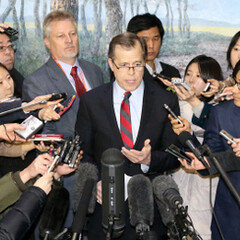hankyoreh
Links to other country sites 다른 나라 사이트 링크
US diplomatic experts speak on need for dialogue with North Korea

By Park Hyun, Washington correspondent
In a hearing on North Korean policy held in the US Senate Foreign Affairs Committee on Mar. 7 (EST), current and former representatives at the six-party talks spoke of the necessity of dialogue with North Korea.
Glyn T. Davies, the US State Department's special representative for North Korea, was among those testifying at the hearing. "The Obama administration's dual-track policy of engagement and pressure toward the DPRK reflects a bipartisan recognition that only a policy of openness to dialogue when possible, combined with sustained, robust pressure through sanctions when necessary, can maximize prospects for progress in denuclearizing North Korea," said Davies.
"Sanctions are not a punitive measure, but rather a tool to impede the development of North Korea's nuclear and missile programs...as well as to make clear the costs of North Korea's defiance of its international obligations," Davies said.
"Working toward our endgame the verifiable denuclearization of the Korean Peninsula in a peaceful manner will require an openness to meaningful dialogue with the DPRK." He added, however, that "the real choice is up to Pyongyang."
These remarks seem to indicate the intention to use the UN Security Council resolution to put pressure on North Korea while at the same time leaving open the possibility of dialogue.
Davies also outlined several important principles for US policy toward North Korea. He said that the US will not recognize North Korea as a nuclear state, that it will not reward North Korea for bad behavior, that US-North Korea relations cannot fundamentally improve without improvement in inter-Korean relations and human rights, and that the US will not tolerate the North provoking neighboring countries.
Stephen Bosworth, Davies' predecessor as special representative for North Korea, also predicted that the US and North Korea will return to the table for talks. "My own personal view is that at some point, I can’t say exactly when, but sooner rather than later, we [the US] will come back to an effort to engage with North Korea. In some manner, only because the alternatives are so bleak."
"The question that will exist at that time is, engage on what basis? Do we again seek to engage on the basis of denuclearization, pretty much by itself, at least as a primary objective, or do we seek to engage on a broader basis, going back for example to the Joint Statement negotiated in the six-party process back in September of 2005, in which all parties signed on to a four-goal, four-objective formulation: denuclearization, a peace treaty to replace the armistice of 1953, an establishment of diplomatic relations among all parties concerned, an agreement to provide energy and economic assistance to North Korea.”
Bosworth added, “In my view, it would be more productive to seek for the outset to engage with North Korea on the basis of that broader agenda.”
Please direct questions or comments to [english@hani.co.kr]

Editorial・opinion
![[Column] Season 2 of special prosecutor probe may be coming to Korea soon [Column] Season 2 of special prosecutor probe may be coming to Korea soon](https://flexible.img.hani.co.kr/flexible/normal/500/300/imgdb/original/2024/0426/3317141030699447.jpg) [Column] Season 2 of special prosecutor probe may be coming to Korea soon
[Column] Season 2 of special prosecutor probe may be coming to Korea soon![[Column] Park Geun-hye déjà vu in Yoon Suk-yeol [Column] Park Geun-hye déjà vu in Yoon Suk-yeol](https://flexible.img.hani.co.kr/flexible/normal/500/300/imgdb/original/2024/0424/651713945113788.jpg) [Column] Park Geun-hye déjà vu in Yoon Suk-yeol
[Column] Park Geun-hye déjà vu in Yoon Suk-yeol- [Editorial] New weight of N. Korea’s nuclear threats makes dialogue all the more urgent
- [Guest essay] The real reason Korea’s new right wants to dub Rhee a founding father
- [Column] ‘Choson’: Is it time we start referring to N. Korea in its own terms?
- [Editorial] Japan’s rewriting of history with Korea has gone too far
- [Column] The president’s questionable capacity for dialogue
- [Column] Are chaebol firms just pizza pies for families to divvy up as they please?
- [Column] Has Korea, too, crossed the Rubicon on China?
- [Correspondent’s column] In Japan’s alliance with US, echoes of its past alliances with UK
Most viewed articles
- 1‘We must say no’: Seoul defense chief on Korean, USFK involvement in hypothetical Taiwan crisis
- 2Is Japan about to snatch control of Line messenger from Korea’s Naver?
- 3No good, very bad game for Korea puts it out of Olympics for first time since 1988
- 4Samsung subcontractor worker commits suicide from work stress
- 5[Editorial] Korea’s surprise Q1 growth requires objective assessment, not blind fanfare
- 6Division commander ordered troops to enter raging flood waters before Marine died, survivor says
- 7N. Korean delegation’s trip to Iran shows how Pyongyang is leveraging ties with Moscow
- 8Korea’s 1.3% growth in Q1 signals ‘textbook’ return to growth, says government
- 9Flying “new right” flag, Korea’s Yoon Suk-yeol charges toward ideological rule
- 10[Column] Park Geun-hye déjà vu in Yoon Suk-yeol